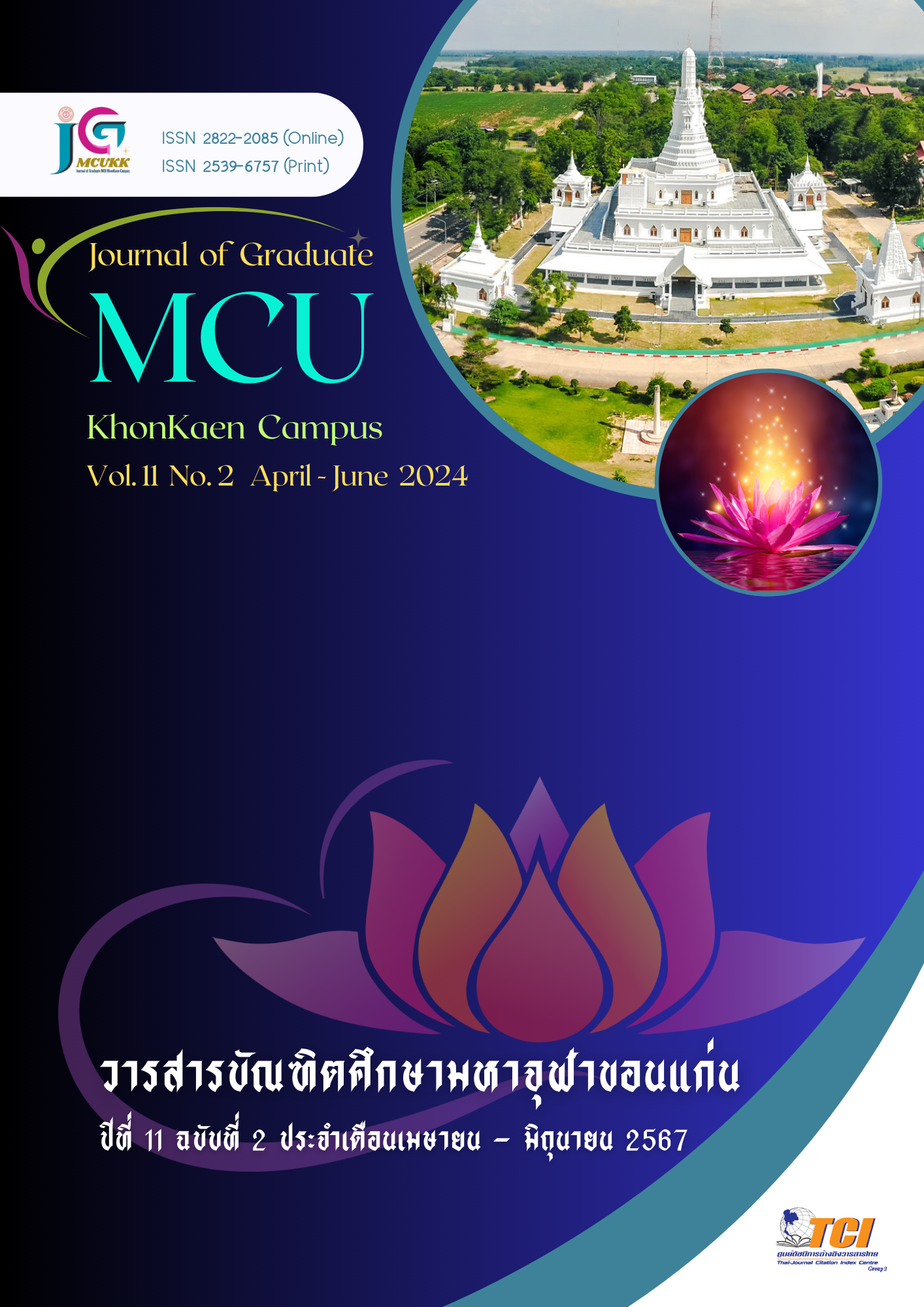การพัฒนาหลักสูตรการจัดการพุทธบริบาลสำหรับผู้สูงอายุ
Main Article Content
บทคัดย่อ
การวิจัยนี้มีวัตถุประสงค์เพื่อ 1) ศึกษาความรู้เกี่ยวกับการบริบาลผู้สูงอายุ 2) สร้างหลักสูตรการจัดการพุทธบริบาลสำหรับผู้สูงอายุ และ 3) ประเมินหลักสูตรการจัดการพุทธบริบาลสำหรับผู้สูงอายุเป็นการวิจัยเชิงคุณภาพ (Qualitative Research) โดยศึกษาเอกสารและสัมภาษณ์เชิงลึกกับบุคคล จำนวน 14 คน ได้แก่ ผู้ประกอบการสถานบริบาล นักศึกษาการบริบาล ผู้ดูแลผู้สูงอายุ ผู้เชี่ยวชาญด้านหลักสูตร ผู้ทรงคุณวุฒิการพยาบาลและพระภิกษุ จากนั้นทำการสนทนากลุ่มกับนักวิชาการผู้ทรงคุณวุฒิและผู้มีส่วนได้ส่วนเสีย จำนวน 5 ท่าน และประเมินหลักสูตรการจัดการพุทธบริบาลสำหรับผู้สูงอายุโดยนักศึกษาพยาบาล จำนวน 6 ท่าน รวบรวมข้อมูลและนำเสนอผลการวิเคราะห์ข้อมูลด้วยเทคนิคการวิเคราะห์เนื้อหา (Content Analysis Technique) ประกอบบริบท (Context)
ผลการวิจัย พบว่า
1) องค์ความรู้เกี่ยวกับการบริบาลผู้สูงอายุด้วยหลัก 5 อ. ภาวนา 4 ประกอบด้วย การจัดการอาหารอนามัย อารมณ์ อดิเรก ออกกำลังกาย และการฝึกสติด้วยหลักภาวนา 4
2) การสร้างหลักสูตรการจัดการพุทธบริบาลสำหรับผู้สูงอายุ มีวัตถุประสงค์ของการพัฒนาหลักสูตรเพื่อบูรณาการวิชาการจัดการเชิงพุทธกับหลักสูตรการบริบาล ด้วยการรวบรวมข้อมูลการสัมภาษณ์เชิงลึกและการสนทนากลุ่ม จากนั้นจึงประเมินหลักสูตรการจัดการพุทธบริบาลสำหรับผู้สูงอายุฉบับสมบูรณ์
3) การประเมินหลักสูตรการจัดการพุทธบริบาลสำหรับผู้สูงอายุ พบว่ามีความพึงพอใจในภาพรวมและรายหัวข้อของหลักสูตรในระดับสูง โดยเรียงลำดับจากมากไปน้อย ได้แก่ รายวิชาการจัดการเชิงพุทธ หลักสูตรการบริบาล ระยะเวลาการศึกษา และค่าใช้จ่าย
4) ข้อเสนอแนะแก่วิทยาลัยสงฆ์ควรออกแบบสภาพแวดล้อมภายในให้ผู้มีส่วนได้ส่วนเสียรับรู้อัตลักษณ์ และรณรงค์ให้นำความรู้จากการฝึกวิปัสสนาไปประยุกต์ใช้เพื่อการพัฒนาบุคลิกภาพ
Article Details

อนุญาตภายใต้เงื่อนไข Creative Commons Attribution-NonCommercial-NoDerivatives 4.0 International License.
เอกสารอ้างอิง
ขจรศักดิ์ สุขเปรม. (2563). การประเมินหลักสูตรนักบริหารอนามัยสิ่งแวดล้อมและส่งเสริมสุขภาพกรณีศึกษาหลักสูตรนักบริหารอนามัยสิ่งแวดล้อมและส่งเสริมสุขภาพ (นบอส.) รุ่นที่ 4 กลุ่มพัฒนาทรัพยากรบุคคล. กรุงเทพฯ: กองการเจ้าหน้าที่กรมอนามัย.
พระมหาเชาวฤทธิ์ นรินฺโท (ทรัพย์สวัสดิ์) และคณะ. (2562). แนวทางการพัฒนาคุณภาพชีวิตผู้สูงอายุตามหลักภาวนา 4 กรณีศึกษา : ผู้สูงอายุบ้านห้วยหอย ตำบลธาตุทอง อำเภอภูเขียว จังหวัดชัยภูมิ. วารสารบัณฑิตศึกษามหาจุฬาขอนแก่น, 6(1), 58-72.
พระมงคลธรรมวิธาน และ ประสิทธิ์ สระทอง. (2560). ผู้สูงอายุกับการปฏิบัติตามหลักพุทธธรรม. Veridian E-Journal, Silpakorn University (Humanities, Social Sciences and arts), 10(3), 1849- 1864.
ผกามาศ ราชมนตรี และคณะ. (2562). การพัฒนาหลักสูตรวิทยาศาสตรบัณฑิต สาขาวิชาเทคโนโลยีชีวภาพในรูปแบบการจัดการศึกษาแบบบูรณาการระหว่างการทำงานกับการเรียนการสอน. (รายงานการวิจัย). มหาสารคาม: มหาวิทยาลัยราชภัฏมหาสารคาม.
วิชัย ดิสสระ. (2535). การพัฒนาหลักสูตรและการสอน. กรุงเทพฯ: มหาวิทยาลัยศรีนครินทรวิโรฒประสานมิตร.
สงัด อุทรานันท์. (2532). พื้นฐานและหลักการพัฒนาหลักสูตร. (พิมพครั้งที่ 3). กรุงเทพฯ: จุฬาลงกรณ์มหาวิทยาลัย.

